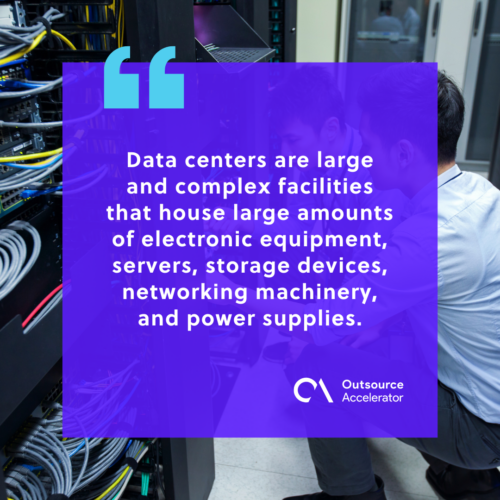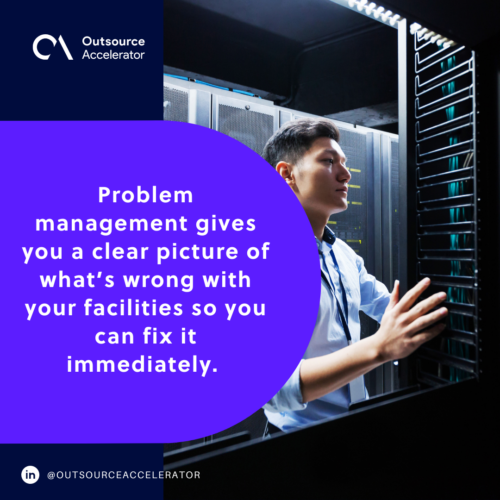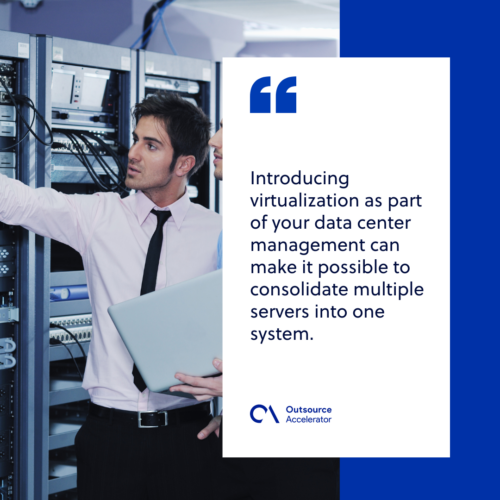Mastering data center management

Now more than ever, businesses rely on robust data centers to process vast amounts of information critical to their operations. However, effective data center management is no small feat.
Data center management encompasses a broad range of tasks, from hardware maintenance and resource optimization to security protocols and disaster recovery.
Read on to learn more about how data center management works and its benefits.
What is data center management?
Data center management concerns all activities related to managing a data center. Data centers are large and complex facilities that house large amounts of electronic equipment, servers, storage devices, networking machinery, and power supplies.
Data center management is vital to maintaining the IT infrastructure that stores and processes data in large quantities. This is necessary for conversion into beneficial knowledge.
Data center management is a highly specialized field and requires extensive knowledge and experience to handle all aspects properly.

Vital tasks of data center management
The following are important areas in the realm of data center management:
Incident management
Data centers are designed to prevent or mitigate incidents from affecting operations. A response plan, however, should still be in place in the event that something goes wrong.
This area of data center management should include procedures for reporting incidents, handling emergencies, and prioritizing responses based on their severity. It also defines what types of incidents warrant notification.
Request fulfillment
Request fulfillment involves taking customer requests and converting them into actionable tasks. It ensures that user requests are fulfilled as quickly as possible, with minimal errors, and in a cost-effective manner.
To fulfill requests, your data center management must tell you how your data is being used and what resources are available.
This also includes how much space is free, the required power supplies, equipment that can be put into the racks, and which applications are run on each server.
Request fulfillment requires understanding and matching your customers’ needs with available resources.
Event management
Event management for your data center involves monitoring and handling events like power failures and outages. Data center management plans for these events and identifies trends in performance over time.
Event management allows data centers to adjust operations so that service disruptions are kept to a minimum.
Problem management
This area of data center management focuses on identifying problems with its various systems and components. IT teams prioritize them according to their severity and impact on operations, then resolve them as quickly as possible.
Problem management gives you a clear picture of what’s wrong with your facilities so you can fix it immediately.
Change management
Change management ensures that all necessary changes to the data center are properly planned and implemented. Data center management handles the impact of these changes on the environment, applications, systems, and users.
Change management is a vital area of data center management. You need to be able to adapt quickly and effectively to changes in order for your organization to survive.
It allows you to plan for future needs while ensuring current changes don’t negatively affect your current data center operations.
Access management
Access management is the process of controlling access to various areas within a facility. A well-designed access management system will ensure that only authorized personnel can access the data center at any given time.
This brings security to data center management.

Best practices for data center management
To optimize your data center management, consider applying the following best practices:
Perform regular maintenance
You should perform routine maintenance on all the components of your data center. These include servers, storage systems, networking equipment, and other hardware devices.
This practice of data center management ensures that everything works properly and reduces the chance of failures or malfunctions.
Document comprehensively
Documentation is a fundamental part of any IT project. Not only will this help you avoid making the same mistakes, but also reduce the risk of losing important information.
Documentation of your data center management should include all details related to the planning, design, implementation, and maintenance of your infrastructure.
Utilize resources efficiently
Efficient use of resources means that you get the most out of your equipment, software, and staff. You’ll want to make sure that you have enough resources for each task.
Introducing virtualization as part of your data center management can make it possible to consolidate multiple servers into one system. This reduces power consumption and minimizes management overhead.
Implement monitoring systems
Monitoring systems provide information about how well a system is performing relative to its parameters.
Monitoring systems for your data center management ensure that the servers operate at peak efficiency. The technology allows you to identify issues before they become problems, enabling you to address them before they affect your customers.
Schedule regular backups
A frequent recommendation of data center management is to schedule regular backups. You won’t need to worry about restoring data from scratch if something goes wrong.
Take advantage of cloud storage services so that you can store backups off-site in case of disaster. It’s also important to test your backups regularly.
Invest in training and development
Companies need to invest in their staff to ensure proper data center management. This includes providing training and development opportunities for employees to keep up with the latest technologies.
Training can include on-site education as well as online courses and certifications. Upskilling can keep employees current on best practices and techniques.
Anticipate future growth and scalability
You don’t want to run out of space or power when your business grows rapidly. Downtime can cost money. To avoid this, plan ahead and make sure your servers have enough room for future expansion.
Data center management should build infrastructure that scales up or down based on current and projected demand. You must also consider future technologies.

Data center infrastructure management (DCIM)
To modernize data center management, a software-based solution was introduced. Data center infrastructure management (DCIM) enables organizations to manage their data centers effectively while improving operational efficiency, minimizing costs, and reducing risks.
It also provides a holistic view of the entire enterprise IT environment. DCIM aims to make data center management easier for IT teams.
With a consolidated view of all resources and services, they can monitor, control, and optimize their environment in real time.







 Independent
Independent




